【湖南师大内部资料】高一英语课件:(牛津译林版)学考m2-u3
文档属性
| 名称 | 【湖南师大内部资料】高一英语课件:(牛津译林版)学考m2-u3 |
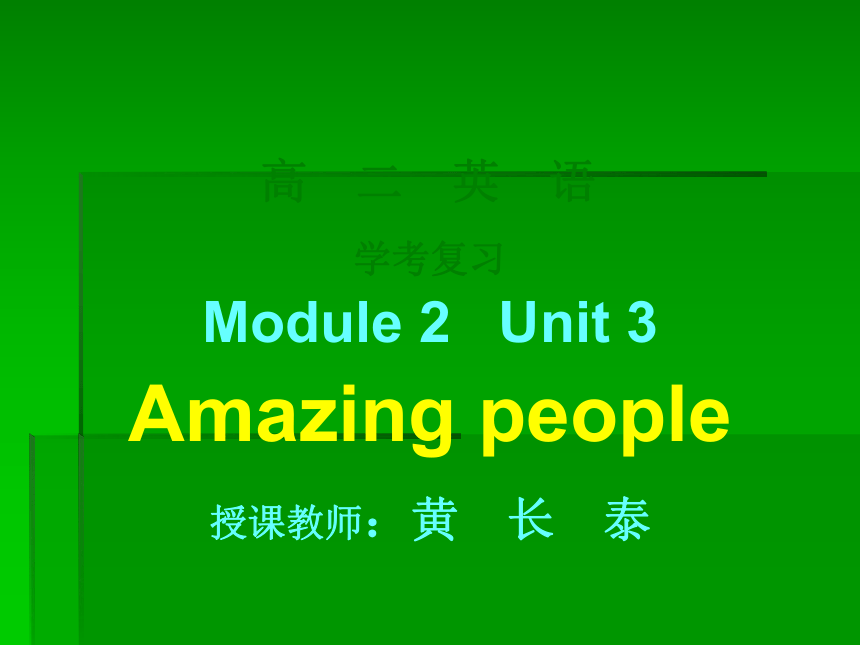
|
|
| 格式 | rar | ||
| 文件大小 | 18.0KB | ||
| 资源类型 | 教案 | ||
| 版本资源 | 牛津译林版 | ||
| 科目 | 英语 | ||
| 更新时间 | 2011-04-03 00:00:00 | ||
图片预览

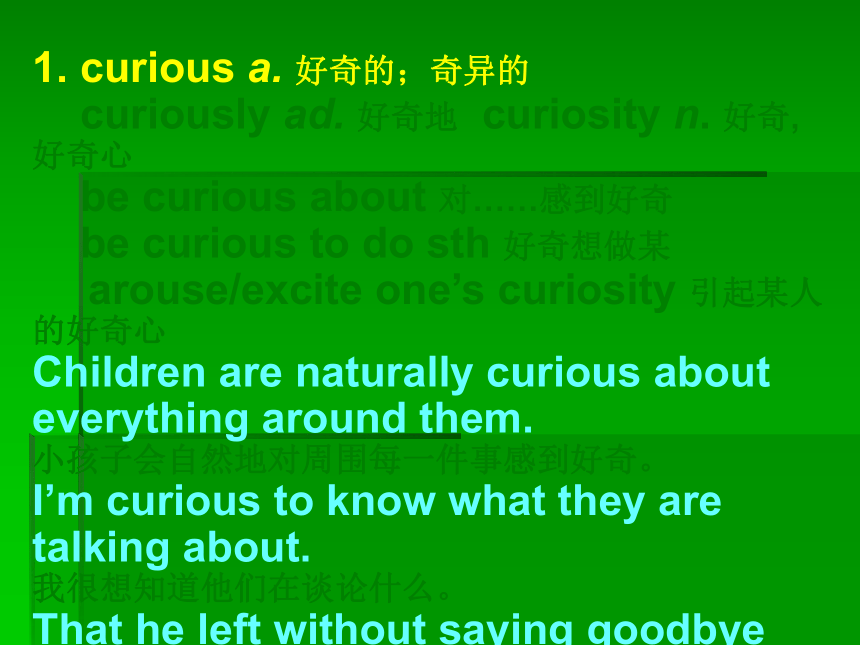

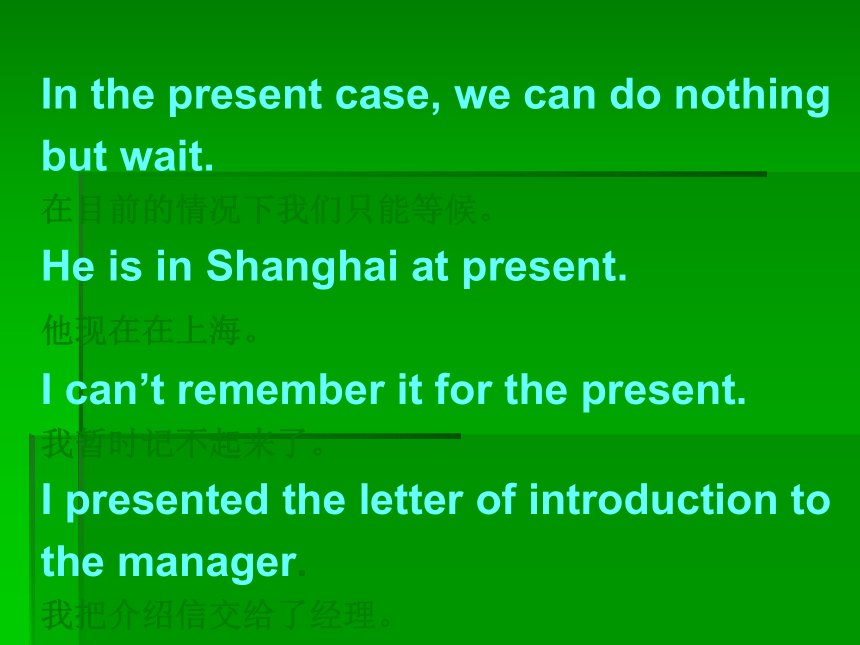
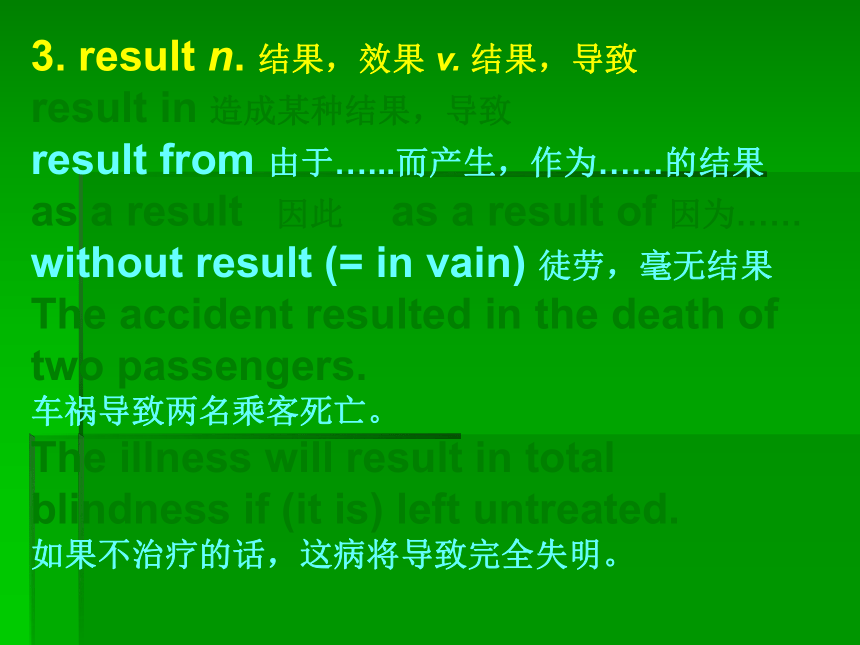
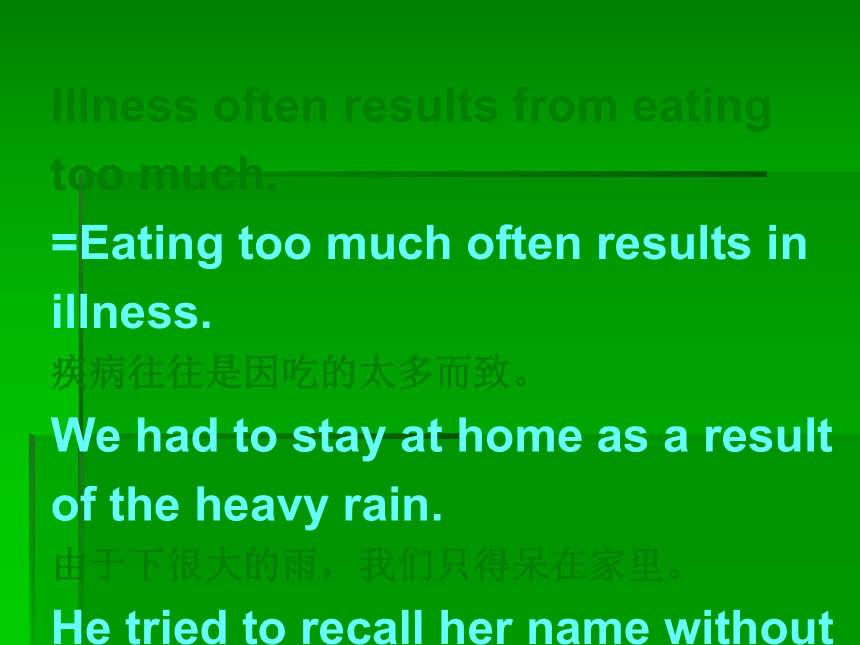
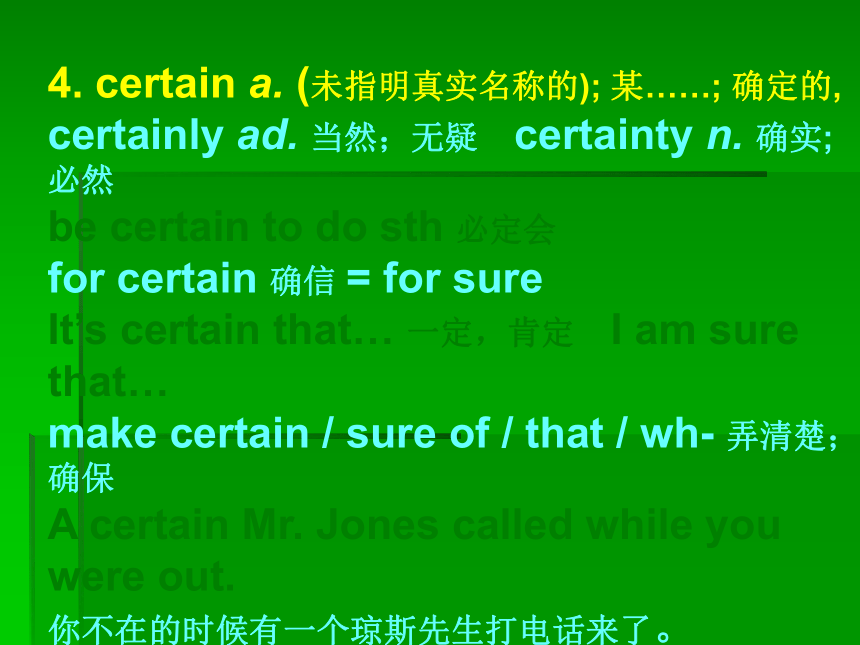
文档简介
课件18张PPT。高 二 英 语学考复习
Module 2 Unit 3
Amazing people 授课教师:黄 长 泰1. curious a. 好奇的;奇异的
curiously ad. 好奇地 curiosity n. 好奇, 好奇心
be curious about 对……感到好奇
be curious to do sth 好奇想做某
arouse/excite one’s curiosity 引起某人的好奇心
Children are naturally curious about everything around them.
小孩子会自然地对周围每一件事感到好奇。
I’m curious to know what they are talking about.
我很想知道他们在谈论什么。
That he left without saying goodbye aroused my curiosity. 他不辞而别引起我的好奇心。2. present a. 出席的,到场(做表语或后置定语);
现在,目前(做前置定语)
n. 礼物,赠品; 目前,现在 v. 呈奉,奉送
at present=at the present time目前
for the present 目前,暂且
be present at 出席,到场
to the present 到目前
How many people were present at the meeting?
有多少人出席了会议?In the present case, we can do nothing but wait.
在目前的情况下我们只能等候。
He is in Shanghai at present.
他现在在上海。
I can’t remember it for the present.
我暂时记不起来了。
I presented the letter of introduction to the manager.
我把介绍信交给了经理。3. result n. 结果,效果 v. 结果,导致
result in 造成某种结果,导致
result from 由于…...而产生,作为……的结果
as a result 因此 as a result of 因为……
without result (= in vain) 徒劳,毫无结果
The accident resulted in the death of two passengers.
车祸导致两名乘客死亡。
The illness will result in total blindness if (it is) left untreated.
如果不治疗的话,这病将导致完全失明。Illness often results from eating too much.
=Eating too much often results in illness.
疾病往往是因吃的太多而致。
We had to stay at home as a result of the heavy rain.
由于下很大的雨,我们只得呆在家里。
He tried to recall her name without result.
他试图想起她的名字,但没能想起。4. certain a. (未指明真实名称的); 某……; 确定的,
certainly ad. 当然;无疑 certainty n. 确实; 必然
be certain to do sth 必定会
for certain 确信 = for sure
It’s certain that… 一定,肯定 I am sure that…
make certain / sure of / that / wh- 弄清楚;确保
A certain Mr. Jones called while you were out.
你不在的时候有一个琼斯先生打电话来了。
She is certain to come.
她一定会来。I don’t know for certain when he will come.
我不确定他什么时候来。
It’s certain that the earth is round.
地球是圆的这一点是肯定的。
I’m certain /sure of your success.
=I’m certain / sure that you will succeed.
我确信你一定会成功。
I’m not certain whether she will go with us.
我没把握她会不会跟我们去。
Make certain of his safe arrival.
要确保他安全到达。5. compare v. 比较,对照
comparison n. 比较,对照
compare sth to sth 把…和…比较;把…比拟为…
compare sth with sth 把……和……比较
compare with sth 匹敌(常否定)
(When) compared with / to 与…相比(作状语)
make a comparison with 与……比较
in comparison with 较之……He began to compare himself with the other students.
他开始拿自己和其他同学相比。
Young people are compared to the rising sun.
年轻人被比作正在升起的太阳。
My works don’t compare with yours.
我的作品没法和你的相比。
When compared with the size of the whole earth, the biggest ocean doesn’t seem big.
与整个地球相比,最大的海洋也不那么大了。6. pick v. 拾起; 采集;挑选
pick up 拾起; 收拾; 学到; 获得; 收听; 用车来接
pick out 挑选出; 拣出; 辨认出
pick flowers 摘花 pick sb’s pocket
We would pick the right person for the work.
我们将为这项工作挑选合适的人选。
Shall I pick you up at the station?
要我去火车站接你吗?
He picked up French when he was in France.
他在法国期间学会了法语。
Can you pick out the man in the crowd?
你能在人群中认出那个人吗?7. manage v. 管理;设法对付
manager n. 经理 management n. 管理;经营
manage to do sth 设法做成某事
Your mother has a genius for managing such things.
你母亲有管理此类事情的才能。
Do you suppose you can manage to get me a passport?
你认为你能给我弄到护照吗?try to do sth 和 manage to do sth 的用法比较
try to do sth 指试图做某事, 但不知是否成功。(过程)
manage to do sth 指设法做成某事。(结果)
The hunter tried to escape from the forest, but he lost his way.
猎人试图逃出森林,但他迷路了。
She managed to pass the driving test with my help.
在我的帮助下,她通过了驾驶考试。过去完成时
(1) 主动形式had done;被动形式had been done
(2) 意义:和现在完成时态类似,只是往过去推一步。
使用过去完成时的关键是:要有一个更晚的过去时间点(一个时间状语或一个过去动作)和那个过去完成时态动作或状态对比存在。
用法:过去A点之前就已经发生的行为B,对A点造成影响或结果。行为B就用过去完成时态。多用瞬间性动词。
They had finished the job when I got there.
We had had lunch by twelve o’clock yesterday. 但是相继发生的过去动作用表示承接关系的
连词或副词连接,都用一般过去时。
She went to the baby and undressed him.
She went to the baby, undressed him and put him in bed.
She rushed to the kid. Then she found the snake near him.另外,表示两个几乎同时发生的瞬间动作的分句用表示“一…就…”的连词 when / the moment (minute) / as soon as连接起来,两个动作也都用一般过去时。
When he opened the door, the bird flew out.
他开门的时候/他一开门,鸟飞了出去。
如果要强调两个动作之间的时间差,先发生的就用过去完成时。如:
When he had opened the door, the bird flew out.
他把门打开之后,鸟飞了出去。这里的when = after。 书面表达 请将下列短文缩写成60词左右的短文。
I'm Dick, and I'm thirteen. I study in a middle school. I live with my grandparents, for my parents work in a factory far away and they live in the factory. They are very busy. They come to see us only on holidays.
I have a friend. His name is Tom and he is a black boy. We often go to school together in the morning. Sometimes I go to Tom's home and do my homework together with him. In this way we can help and learn from each other. I'm Dick, a boy of thirteen and I'm a middle school student. My parents work and live in a far away factory. They come to see my grandparents and me on holidays.
My friend Tom is a black boy. To help each other, we often go to school in the morning and sometimes we do our homework after school together at Tom's home.
Module 2 Unit 3
Amazing people 授课教师:黄 长 泰1. curious a. 好奇的;奇异的
curiously ad. 好奇地 curiosity n. 好奇, 好奇心
be curious about 对……感到好奇
be curious to do sth 好奇想做某
arouse/excite one’s curiosity 引起某人的好奇心
Children are naturally curious about everything around them.
小孩子会自然地对周围每一件事感到好奇。
I’m curious to know what they are talking about.
我很想知道他们在谈论什么。
That he left without saying goodbye aroused my curiosity. 他不辞而别引起我的好奇心。2. present a. 出席的,到场(做表语或后置定语);
现在,目前(做前置定语)
n. 礼物,赠品; 目前,现在 v. 呈奉,奉送
at present=at the present time目前
for the present 目前,暂且
be present at 出席,到场
to the present 到目前
How many people were present at the meeting?
有多少人出席了会议?In the present case, we can do nothing but wait.
在目前的情况下我们只能等候。
He is in Shanghai at present.
他现在在上海。
I can’t remember it for the present.
我暂时记不起来了。
I presented the letter of introduction to the manager.
我把介绍信交给了经理。3. result n. 结果,效果 v. 结果,导致
result in 造成某种结果,导致
result from 由于…...而产生,作为……的结果
as a result 因此 as a result of 因为……
without result (= in vain) 徒劳,毫无结果
The accident resulted in the death of two passengers.
车祸导致两名乘客死亡。
The illness will result in total blindness if (it is) left untreated.
如果不治疗的话,这病将导致完全失明。Illness often results from eating too much.
=Eating too much often results in illness.
疾病往往是因吃的太多而致。
We had to stay at home as a result of the heavy rain.
由于下很大的雨,我们只得呆在家里。
He tried to recall her name without result.
他试图想起她的名字,但没能想起。4. certain a. (未指明真实名称的); 某……; 确定的,
certainly ad. 当然;无疑 certainty n. 确实; 必然
be certain to do sth 必定会
for certain 确信 = for sure
It’s certain that… 一定,肯定 I am sure that…
make certain / sure of / that / wh- 弄清楚;确保
A certain Mr. Jones called while you were out.
你不在的时候有一个琼斯先生打电话来了。
She is certain to come.
她一定会来。I don’t know for certain when he will come.
我不确定他什么时候来。
It’s certain that the earth is round.
地球是圆的这一点是肯定的。
I’m certain /sure of your success.
=I’m certain / sure that you will succeed.
我确信你一定会成功。
I’m not certain whether she will go with us.
我没把握她会不会跟我们去。
Make certain of his safe arrival.
要确保他安全到达。5. compare v. 比较,对照
comparison n. 比较,对照
compare sth to sth 把…和…比较;把…比拟为…
compare sth with sth 把……和……比较
compare with sth 匹敌(常否定)
(When) compared with / to 与…相比(作状语)
make a comparison with 与……比较
in comparison with 较之……He began to compare himself with the other students.
他开始拿自己和其他同学相比。
Young people are compared to the rising sun.
年轻人被比作正在升起的太阳。
My works don’t compare with yours.
我的作品没法和你的相比。
When compared with the size of the whole earth, the biggest ocean doesn’t seem big.
与整个地球相比,最大的海洋也不那么大了。6. pick v. 拾起; 采集;挑选
pick up 拾起; 收拾; 学到; 获得; 收听; 用车来接
pick out 挑选出; 拣出; 辨认出
pick flowers 摘花 pick sb’s pocket
We would pick the right person for the work.
我们将为这项工作挑选合适的人选。
Shall I pick you up at the station?
要我去火车站接你吗?
He picked up French when he was in France.
他在法国期间学会了法语。
Can you pick out the man in the crowd?
你能在人群中认出那个人吗?7. manage v. 管理;设法对付
manager n. 经理 management n. 管理;经营
manage to do sth 设法做成某事
Your mother has a genius for managing such things.
你母亲有管理此类事情的才能。
Do you suppose you can manage to get me a passport?
你认为你能给我弄到护照吗?try to do sth 和 manage to do sth 的用法比较
try to do sth 指试图做某事, 但不知是否成功。(过程)
manage to do sth 指设法做成某事。(结果)
The hunter tried to escape from the forest, but he lost his way.
猎人试图逃出森林,但他迷路了。
She managed to pass the driving test with my help.
在我的帮助下,她通过了驾驶考试。过去完成时
(1) 主动形式had done;被动形式had been done
(2) 意义:和现在完成时态类似,只是往过去推一步。
使用过去完成时的关键是:要有一个更晚的过去时间点(一个时间状语或一个过去动作)和那个过去完成时态动作或状态对比存在。
用法:过去A点之前就已经发生的行为B,对A点造成影响或结果。行为B就用过去完成时态。多用瞬间性动词。
They had finished the job when I got there.
We had had lunch by twelve o’clock yesterday. 但是相继发生的过去动作用表示承接关系的
连词或副词连接,都用一般过去时。
She went to the baby and undressed him.
She went to the baby, undressed him and put him in bed.
She rushed to the kid. Then she found the snake near him.另外,表示两个几乎同时发生的瞬间动作的分句用表示“一…就…”的连词 when / the moment (minute) / as soon as连接起来,两个动作也都用一般过去时。
When he opened the door, the bird flew out.
他开门的时候/他一开门,鸟飞了出去。
如果要强调两个动作之间的时间差,先发生的就用过去完成时。如:
When he had opened the door, the bird flew out.
他把门打开之后,鸟飞了出去。这里的when = after。 书面表达 请将下列短文缩写成60词左右的短文。
I'm Dick, and I'm thirteen. I study in a middle school. I live with my grandparents, for my parents work in a factory far away and they live in the factory. They are very busy. They come to see us only on holidays.
I have a friend. His name is Tom and he is a black boy. We often go to school together in the morning. Sometimes I go to Tom's home and do my homework together with him. In this way we can help and learn from each other. I'm Dick, a boy of thirteen and I'm a middle school student. My parents work and live in a far away factory. They come to see my grandparents and me on holidays.
My friend Tom is a black boy. To help each other, we often go to school in the morning and sometimes we do our homework after school together at Tom's home.
